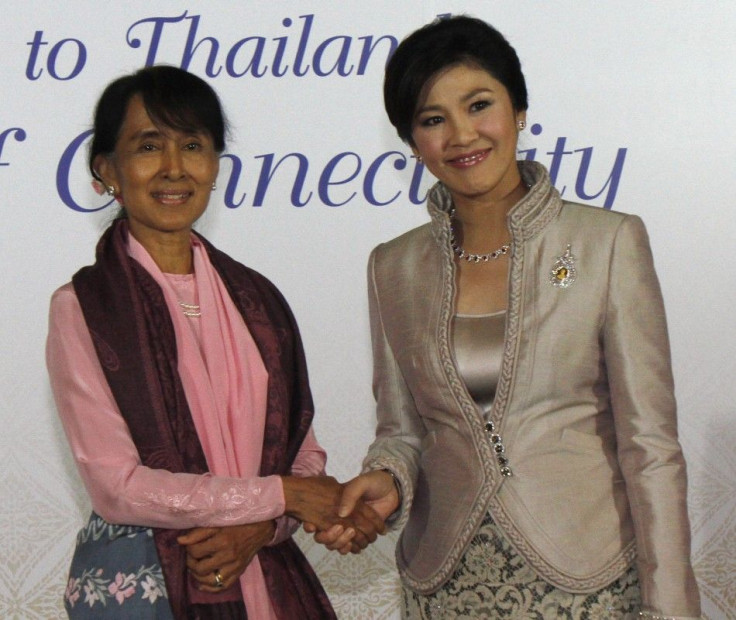Aung San Suu Kyi?s Star Power Dominates Bangkok Economic Summit

Aung San Suu Kyi, the iconic pro-democracy activist from Myanmar, has made a splash at the opening of the World Economic Forum in Bangkok, during the third day of her visit to Thailand -- her first time out of her native country in more than two decades.
Suu Kyi’s star-power overwhelmed the summit, with eager admirers, including other diplomats and delegates from around the world, as well as autograph-seekers asking for moments of her time and even taking photographs.
Not even the presence of The Prime Ministers of Bahrain, Laos, Thailand and Vietnam and the President of Indonesia can overshadow the fascination with the Burmese heroine.
Even the President of Myanmar, Thein Sein, pulled out of attending the summit, allegedly because he did not wish to be upstaged by Suu Kyi.
Surin Pitsuwan, the secretary-general of the Association of Southeast Asian Nations, attributed the excitement at the summit solely to Suu Kyi’s electrifying presence.
“It’s a full house,” he said. “I don’t know -- can we panelists claim credit for that? Or is it because of The Lady [Suu Kyi]?”
Helene Gayle of CARE, a U.S. international aid organization, and co-chair of the forum told reporters: What she is doing by being here, is incredibly significant. It begins that opportunity for a dialogue that I think will be very important for Burma, but also for the rest of this region.
During the summit, Suu Kyi was protected by a team of bodyguards and did not speak to media. She attended some panel discussions, and is expected to formally address the gathering on Friday.
It is unclear if she will talk about the easing of sanctions against Myanmar by various foreign nations, including the U.S. and UK.
U.S. Senator Susan Collins, a Republican from Maine, who is at the Bangkok summit, told reporters: “My impression is that Burma is on a tipping point. I’m cautiously optimistic Burma will go in the right direction. We look forward to further advice and counsel from Daw Suu.”
Suu Kyi, who won a seat in parliament last month, has emerged as the face of democratic reforms in a country that was ruled by a repressive military regime for more than 50 years, prior to the emergence of a nominally civilian government in 2010.
She had spent 15 of the past 24 years under house arrest and refrained from leaving the country out of fear she would never be permitted to return.
On Wednesday, Suu Kyi thrilled Burmese migrant workers in a poor suburb of Bangkok, with her words of encouragement and support.
She is scheduled to meet with migrants again after departing the summit.
However, Thai authorities are concerned about her planned visit to a refugee camp housing Burmese in the northwestern Tak province, which borders Myanmar.
Local officials have promised tight security when Suu Kyi visits the Mae La camp, where more than 40,000 members of the Karen ethnic minority group are housed.
Next month, Suu Kyi will voyage to Europe, where she is expected to make a speech in Geneva and also journey to Oslo, Norway, to formally accept the Nobel Peace Prize she was awarded in 1991. She is also expected to make stops in Paris, Ireland and the UK, where she has family members.
Suu Kyi might also make a trip to India sometime this year, following an invitation by Prime Minister Manmohan Singh.
© Copyright IBTimes 2024. All rights reserved.





















